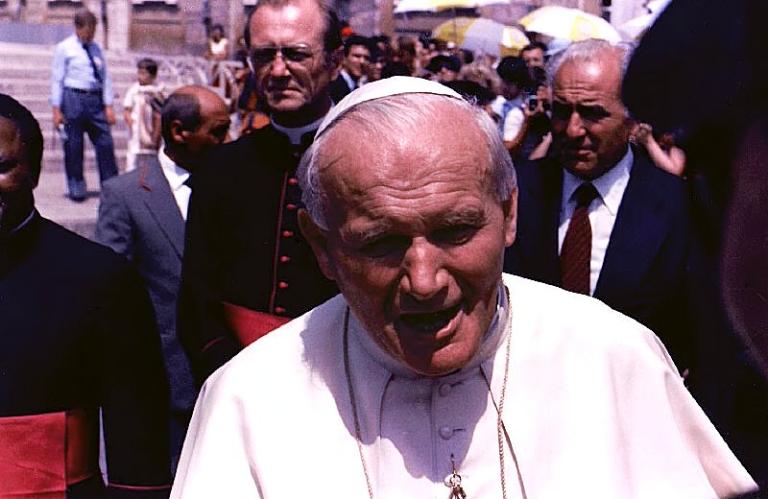
The very first joint bi-weekly Deseret News column by Professor William Hamblin and Professor Daniel Peterson appeared back on 14 January 2012.
This is how it read:
When an adviser once warned him against conflict with the Catholic Church, Joseph Stalin contemptuously demanded “How many divisions does the pope have?”
It was a rhetorical question, and presumed the obvious: With no army at all, what threat could the pope pose to Soviet tyranny?
Stalin’s presumption was wrong. Less than three decades after his death, the Catholic Church elected a Polish pope, and this was a vital factor in the collapse of communism, not only in Poland but throughout eastern Europe. The triumphant homecoming of John Paul II in 1979 demonstrated that the pope actually has many powerful “divisions.”
Blindness to the continuing power of religion isn’t limited to Kremlin atheists. In the mid- to late-1970s, as discontent with the rule of the shah in Iran began to boil, both government and academic experts on the Middle East routinely downplayed it.
After all, who were the shah’s opponents? A ragtag alliance of bazaar merchants, led by Islamic clergy who, it seemed to some, had scarcely emerged from the Middle Ages. The shah, by contrast, had a large and well-trained army. He had tanks. He had jet fighter aircraft. In a struggle between the 20th century and the seventh, who could doubt the outcome?
For three decades now, the West has struggled to cope with the Islamic Republic of Iran. We’ve faced militant Islam in Algeria, in the Sudanese civil war, in Afghanistan, in Beirut and south Lebanon, in Iraq, in Indonesia and at the World Trade Center. It’s clear that Islamic fundamentalism will challenge us for years to come, abroad and at home.
The notion that the world is growing more secular — that, as technology and prosperity increase, religion inevitably loses its influence — is simply wrong. While Stalin and his successors are gone, the pope remains. Even in the State Department, an awareness of religion as a forgotten dimension of diplomacy and political analysis is now an important factor in strategic deliberations.
The realization has hardly come too soon. Around the world, religions and religious people exercise not a diminishing but an increasing influence on public affairs. India and Pakistan exist as separate countries because of divisions between Hindus and Muslims. Now Sikh activism complicates the scene. Extremist Catholics and Protestants in northern Ireland were engaged in bloody conflict for decades. Ultra-orthodox Jews in Israel confront an ever more militant Palestinian Islamic movement. U.S. politicians court the Christian Right, while “New Atheists” propose a radical secularization of all societies.
Even the prosperous and largely secular Japanese have suffered from the deadly fantasies of a conspiratorial religious group armed with poison gas.
Of course, not all manifestations of religion in contemporary society are negative. While violent, frightening or bizarre elements of religion grab headlines, its most powerful effects are surely found in the private lives of ordinary people, in their work and families, in what they choose to value or reject, and in how they respond to stress and sorrow. The surge of evangelical Christianity gives meaning and discipline to millions of Americans. Prison officials across the nation report that the spread of Islam and conservative Protestantism assists in rehabilitating inmates and lowering their rate of recidivism. Recent studies seem to confirm the power of religious belief to promote mental health, and even to aid recovery from illness and injury.
Religion is hardly dead — though some wish it were. Fundamentalist Christianity flourishes in Brazil. In rural Guatemala, it may already have supplanted Catholicism. Mormonism, some say, is poised to become the first new global faith since Islam emerged from Arabia in the seventh century, and the world’s first Mormon presidents may possibly be elected this year both in the US and, amazingly, in Mali. U.S. Muslims now outnumber adherents of some of the so-called “mainline” churches. Overflowing mosques can be found in all major cities in Europe, and there will soon be more regular worshipers in the mosques of the United Kingdom than in Anglican churches. The Islamic prayer call echoes through Balkan cities where, not long ago, atheism was imposed by law and the practice of any faith at all was a criminal offense.
Religion is vibrantly, fascinatingly, alive.
This column will examine it around the world — Christian and non-Christian, ancient, medieval and modern — from many perspectives. Religion is of virtually infinite interest and human significance (not to mention its importance in eternity). We hope that you share our enthusiasm for this richly varied and instructive subject.
Reposted from San Diego, California











